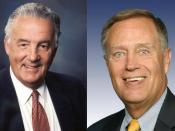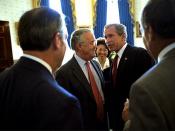Though many different explanations are offered for the collapse of Enron, the nation's seventh largest corporation, yet it's leadership was an obvious factor that contributed to Enron's demise. It will be completely erroneous, however, to think that the leaders of Enron were anything but superb. From 1997-2001, the leaders of this company transformed Enron into a "corporation of the new millennium" and a favorite of investors and analysts. Most leaders of Enron like Chairman Kenneth Lay, Chief Executive Officer Jeffrey Skilling and Chief Financial Officer Andrew Fastow met all the conventional criteria for good leadership. They all possessed the fundamental nature of leadership, which was to influence other people into their beliefs and their values. They had bold market leading vision and were able to create an innovative fast-paced organizational culture that attracted the best and brightest of people. Lay had been described as a pioneering leader and a true visionary, Skilling was described as one of the top five CEOs in America and CFO Magazine gave Fastow an award for excellence for his work in Enron as a financial wizard.
They were able to transform a $4 billon dollar natural gas distribution company to a $40 billion dollar major trader in both gas and electricity, as well as other businesses.
But this only tells half the story about the leadership; the other half hides below the surface. While the company openly touted the value system of Respect, Integrity, Communication and Excellence (RISE), the leaders of the company failed to integrate these core values into their operations. In fact the leaders disapproved any messages of dissent and were dismissive of critics. They encouraged a "yes man" culture that throttled dissent and disagreement. "Enron had a ruthless and reckless culture that lavished rewards on those who played the game, while persecuting...


